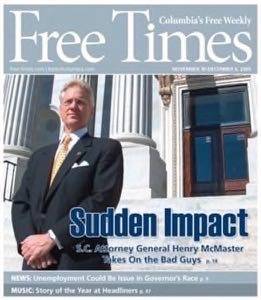As we reported earlier this month, Craigslist, after a slew of negative press and pressure from various political organizations, decided to revamp its ‘erotic services’ section. For South Carolina’s Attorney General, Henry McMaster, this was not enough of a change, however, and last week, McMaster announced that we would still file charges against the classified-ad site as, according to him, “the Craigslist South Carolina site continues to display advertisements for prostitution and graphic pornographic material.”

In return, Craigslist has now filed its own suit in federal court in South Carolina, “seeking declaratory relief and a restraining order with respect to criminal charges he [McMaster] has repeatedly threatened against Craigslist and its executives.”
As Craigslist’s CEO, Jim Buckmaster, argued in an unusually aggressive blog post on Monday, it is hard not to think that McMaster unfairly singled out Craigslist for his own political gain, especially given that the changes Craigslist instituted last week, go even beyond the proposed measures the Attorney General himself accepted in a joint statement of over 40 Attorney Generals and Craigslist.
In his ultimatum, McMaster asks Craigslist to “remove the portions of the Internet site dedicated to South Carolina and its municipal regions which contain categories for and functions allowing for the solicitation of prostitution and the dissemination and posting of graphic pornographic material” within ten (10) days.” Given that anybody can post anything on Craigslist (except for the new ‘Adult Services’ section, which is now closely monitored), this is far too broad a statement and Buckmaster rightly argues that Craigslist would just have to close shop in South Carolina.

The South Carolina “adult services” section of Craigslist currently only features a few ads, and they are about as tame as the ads for chatlines for singles that run on late-night TV all over the country. At this point, most ads just feature a (non-pornographic) photo and a phone number.
A number of legal experts have argued that the “safe harbor” provision of the Digital Millennium Copyright Act (DMCA) protects Craigslist from criminal prosecution, as, according to the DMCA, an “interactive computer service” can not be held responsible for content posted on the service’s site.









